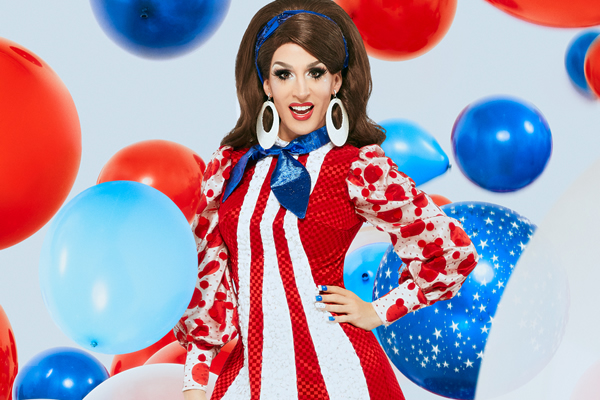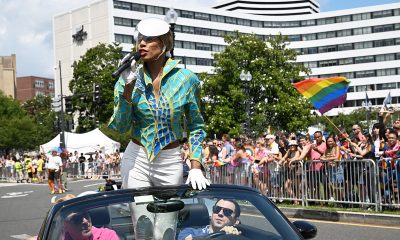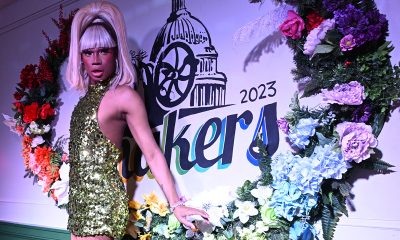Arts & Entertainment
COVID-19 can’t keep Jackie Cox down
Drag performers keeping busy in digital realm


We’re navigating the current COVID-19 crisis as best we can—but each day forces us to admit how little we’ve learned from what pandemic-themed science fiction, countries with universal health care, and people who cut their own hair have been trying to tell us for years.
Yeah, everybody’s pretty much making it up as they go along—and in the case of entertainers displaced from shuttered clubs, bars, and theaters that are sources of income as well as community, stay-at-home drag queens are keeping the cobwebs off their wigs by entertaining fans in the digital realm.
The Blade recently reached out and touched one such indefatigable gal (via email), to get her take on innovation in this time of isolation.
Thanks to her presence as a contestant on the currently airing season 12 of “RuPaul’s Drag Race,” the whole world has been discovering what New York City has known for years: There’s nobody out there quite like Jackie Cox.
Born in Canada, the Star Trek-loving “Persian princess of drag” wears her nerdy nature, Iranian heritage, obsession with Disney, and love of ’80s/’90s pop culture as badges of honor. Pin those badges on a dress as pick-and-choose accessories, and they work just as well on the “Drag Race” runway as they have on the cabaret stages of New York City, where writer/performer Cox fashioned and refined the sharp, sassy, clever, campy, and occasionally political persona that’s put more than one smile on the hard-to-please faces of Mama Ru and Michelle Visage.
That persona changes slightly according to the hat Cox wears. As writer/star, she put her own spin on Barbara Eden’s iconic bottle-dweller, in the three-part “I Dream of Jackie” series, which followed the adventures of a magical genie who emerged from underneath the stage of Manhattan’s Laurie Beechman Theatre to find a chaotic and cynical world that was no match for her sweet, optimistic nature. Also at the Beechman, Cox appeared in a series of shows with The Hell’s Kitchenettes, an Andrew Sisters-like trio of singing waitresses whose wacky schemes to save their diner always backfire, but never fail to bring it back from the brink of disaster. And last year, also at the Beechman, Cox and frequent collaborator Chelsea Piers put the Romy and Michelle/Laverne & Shirley friendship dynamic into a blender, added some iconic songs from the ’80s/’90s, and created the tasty comedic smoothie that was “Jackie & Chelsea’s High School Reunion.”
The Blade: On April 18, you presented “The Jackie Cox Variety Show” as part of StageIt.com’s Digital Drag Fest series. What songs and segments did you serve fans, and how was the experience? Can we expect to see more of you on the Digital Drag Fest platform?
Jackie Cox: I’ve now done two editions of the “The Jackie Cox Variety Show,” with a new, politically minded version performed on April 21, as part of the campaign to “Drag Out The Vote,” and get the LGBTQ+ community registered to vote! Both versions keep a similar structure, in that it’s a variety show with different comedy segments and songs. I do a cooking segment, a faux-news segment, and recurring gags that happen throughout. It very much harkens back to that 1960s and 1970s variety show feel. I hope to continue doing them, and it’s a great creative space for me to try new ideas in this format. Visit stageit.com/digitaldragfest for the latest information on all their upcoming events.
Blade: Has this forced time away from public performance impacted your creativity, creative output, and approach to using online/social media as an expression of your artistry?
Cox: I think this time away from performing on stage has definitely given us a new frontier of what drag can be in the future, and live performance in general. Having the ability to connect with fans through live streaming platforms presents a lot of fun ways to creatively think outside the box. I’ve been finding myself actually able to engage with fans online in meaningful ways that I probably wouldn’t have been able to if I had been traveling and performing all over the country, as was originally planned.
Blade: Spoilers and gag orders aside, tell us everything you can/want, about part of “RDPR” Season 12?
Cox: Participating in this season of “RuPaul’s Drag Race” has truly been a dream come true. I learned so much about myself and about my drag from participating in the competition. Spoilers aside—I think from what the audience has already seen, this season is filled with so much talent, personality, and heart.
Blade: Have you had any notable virtual interactions with fans during this period of social distancing?
Cox: Well, the fans have CERTAINLY been vocal and I must say, I feel a bit behind in how the kids talk these days, but I’m learning. (Cool Aunt here.) That said, I’ve been trying to engage with fans as much as I can. I have had so many fans reach out saying they feel represented by who I am and what I’m doing on the show. I’ve also had fans who are either too far away, or otherwise would be unable to come see a live show, and are just so thrilled they get to see live drag from the comfort of their own homes.
Blade: How did you come to be involved in the April 25 Community Strong Identity panel (via witch.tv/popculturehero)? What can we expect?
Cox: I have known Randy Frank, the founding member of the Lambda Quadrant non-profit, which is putting on the event, for a number of years, since we originally connected through our love of “Star Trek.” (It’s not just the glasses—I really am a nerd!)
The panel will be moderated by Chase Masterson (from “Star Trek: Deep Space Nine”) and Raymond Lister, in support of their “Pop Culture Her Coalition”—the first-ever organization to teach empathy, resilience, and real-life heroism over bullying, racism, misogyny, LGBTQ-bullying, cyberbullying, and other forms of hate, by using stories from TV, comics, and movies, which kids find relatable and accessible. In our panel (which includes “Drag Race” alums Silky Nutmeg Ganache and Pandora Boxx, among others), we will be discussing how we tackle these issues in our lives, and share our experiences.
Blade: Are there any other ways, now or upcoming, that fans can access you in the digital realm?
Cox: Yes! I’m @jackiecoxnyc across all social media platforms (Instagram, Twitter, Facebook… even TikTok!), where I will post the latest information on any and all upcoming shows and appearances.
Blade: The all-clear is called and we’re allowed to gather in public again. What are the first things you’re going to do?
Cox: Definitely go have a good laugh and a margarita (and HUGS!) with friends at any of my favorite bars in Hell’s Kitchen, NYC! I miss salty rims!
Photos
PHOTOS: Montgomery County Pride in the Plaza
LGBTQ celebration held in downtown Silver Spring

Montgomery County Pride in the Plaza was held on Sunday, June 29 at Veterans Plaza in Silver Spring, Md.
(Washington Blade photos by Michael Key)























The fifth annual Fredericksburg Pride march and festival was held on Saturday, June 28. A march through the streets of downtown Fredericksburg, Va. was followed by a festival at Riverfront Park.
(Washington Blade photos by Michael Key)



















India
Anaya Bangar challenges ban on trans women in female cricket teams
Former Indian cricketer Sanjay Bangar’s daughter has received support

Anaya Bangar, the daughter of former Indian cricketer Sanjay Bangar, has partnered with the Manchester Metropolitan University Institute of Sport in the U.K. to assess her physiological profile following her gender-affirming surgery and undergoing hormone replacement therapy.
From January to March 2025, the 23-year-old underwent an eight-week research project that measured her glucose levels, oxygen uptake, muscle mass, strength, and endurance after extensive training.
The results, shared via Instagram, revealed her metrics align with those of cisgender female athletes, positioning her as eligible for women’s cricket under current scientific standards. Bangar’s findings challenge the International Cricket Council’s 2023 ban on transgender athletes in women’s cricket, prompting her to call for a science-based dialogue with the Board of Control for Cricket in India and the ICC to reform policies for trans inclusion.
“I am talking with scientific evidence in my hand,” Bangar said in an interview posted to her Instagram page. “So, I hope, this makes an impact and I will be hoping to BCCI and ICC talking with me and discussing this further.”
On Nov. 21, 2023, the ICC enacted a controversial policy barring trans women from international women’s cricket. Finalized after a board meeting in Ahmedabad, India, the regulation prohibits any trans player who has experienced male puberty from competing, irrespective of gender-affirming surgery or hormone therapy. Developed through a 9-month consultation led by the ICC’s Medical Advisory Committee, the rule aims to safeguard the “integrity, safety, and fairness” of women’s cricket but has drawn criticism for excluding athletes like Canada’s Danielle McGahey, the first trans woman to play internationally. The policy, which allows domestic boards to set their own rules, is slated for review by November 2025.
Bangar shared a document on social media verifying her participation in a physiological study at the Manchester Metropolitan University Institute of Sport, conducted from Jan. 20 to March 3, 2025, focused on cricket performance. The report confirmed that her vital metrics — including hemoglobin, blood glucose, peak power, and mean power — aligned with those of cisgender female athletes. Initially, her fasting blood glucose measured 6.1 mmol/L, slightly above the typical non-diabetic range of 4.0–5.9 mmol/L, but subsequent tests showed it normalized, reinforcing the study’s findings that her physical profile meets female athletic standards.
“I am submitting this to the BCCI and ICC, with full transparency and hope,” said Bangar. “My only intention is to start a conversation based on facts not fear. To build space, not divide it.”
In a letter to the BCCI and the ICC, Bangar emphasized her test results from the Manchester Metropolitan University study. She explained that the research aimed to assess how hormone therapy had influenced her strength, stamina, hemoglobin, glucose levels, and overall performance, benchmarked directly against cisgender female athletic standards.
Bangar’s letter to the BCCI and the ICC clarified the Manchester study was not intended as a political statement but as a catalyst for a science-driven dialogue on fairness and inclusion in cricket. She emphasized the importance of prioritizing empirical data over assumptions to shape equitable policies for trans athletes in the sport.
Bangar urged the BCCI, the world’s most influential cricket authority, to initiate a formal dialogue on trans women’s inclusion in women’s cricket, rooted in medical science, performance metrics, and ethical fairness. She called for the exploration of eligibility pathways based on sport-specific criteria, such as hemoglobin thresholds, testosterone suppression timelines, and standardized performance testing. Additionally, she advocated for collaboration with experts, athletes, and legal advisors to develop policies that balance inclusivity with competitive integrity.
“I am releasing my report and story publicly not for sympathy, but for truth. Because inclusion does not mean ignoring fairness, it means measuring it, transparently and responsibly,” said Bangar in a letter to the BCCI. “I would deeply appreciate the opportunity to meet with you or a representative of the BCCI or ICC to present my findings, discuss possible policy pathways, and work towards a future where every athlete is evaluated based on real data, not outdated perceptions.”
Before her transition, Bangar competed for Islam Gymkhana in Mumbai and Hinckley Cricket Club in the U.K., showcasing her talent in domestic cricket circuits. Her father, Sanjay Bangar, was a dependable all-rounder for the Indian national cricket team from 2001 to 2004, playing 12 test matches and 15 One Day Internationals. He later served as a batting coach for the Indian team from 2014 to 2019, contributing to its strategic development.
Cricket in India is a cultural phenomenon, commanding a fanbase of more than 1 billion, with more than 80 percent of global cricket viewership originating from the country.
The International Cricket Council, the sport’s governing body, oversees 12 full member nations and more than 90 associate members, with the U.S. recently gaining associate member status in 2019 and co-hosting the 2024 ICC Men’s T20 World Cup. The BCCI generated approximately $2.25 billion in revenue in the 2023–24 financial year, primarily from the Indian Premier League, bilateral series, and ICC revenue sharing. The ICC earns over $3 billion from media rights in India alone for the 2024–27 cycle, contributing nearly 90 percent of its global media rights revenue, with the BCCI receiving 38.5 percent of the ICC’s annual earnings, approximately $231 million per year.
Women’s cricket in India enjoys a growing fanbase, with over 300 million viewers for the Women’s Premier League in 2024, making it a significant driver of the sport’s global popularity. The International Cricket Council oversees women’s cricket in 12 full member nations and over 90 associate members, with the U.S. fielding a women’s team since gaining associate status in 2019 and competing in ICC events like the 2024 Women’s T20 World Cup qualifiers. The BCCI invests heavily in women’s cricket, allocating approximately $60 million annually to the WPL and domestic programs in 2024–25, while contributing to the ICC’s $20 million budget for women’s cricket development globally. India’s media market for women’s cricket, including WPL broadcasting rights, generated $120 million in 2024, accounting for over 50 percent of the ICC’s women’s cricket media revenue.
“As a woman, I feel when someone says that they are women, then they are, be trans or cis. A trans woman is definitely the same as a cis woman emotionally and in vitals, and specially, when someone is on hormone replacement therapy. Stopping Anaya Bangar from playing is discrimination and violation of her rights. It is really sad and painful that every trans woman need to fight and prove their identity everywhere,” said Indrani Chakraborty, an LGBTQ rights activist and a mother of a trans woman. “If ICC and BCCI is stopping her from playing for being transgender, then I will say this to be their lack of awareness and of course the social mindsets which deny acceptance.”
Chakraborty told the Blade that Bangar is an asset, no matter what. She said that the women’s cricket team will only benefit by participation, but the discriminating policies are the hindrance.
“Actually the transgender community face such discrimination in every sphere. In spite of being potent, they face rejection. This is highly inhuman. These attitudes is regressive and will never let to prosper. Are we really in 2025?,” said Chakraborty. “We, our mindset and the society are the issues. We, as a whole, need to get aware and have to come together for getting justice for Anaya. If today, we remain silent, the entire community will be oppressed. Proper knowledge of gender issues need to be understood.”
The BCCI and the International Cricket Council have not responded to the Blade’s repeated requests for comment.




















